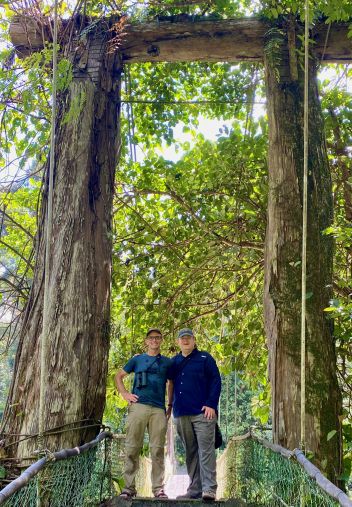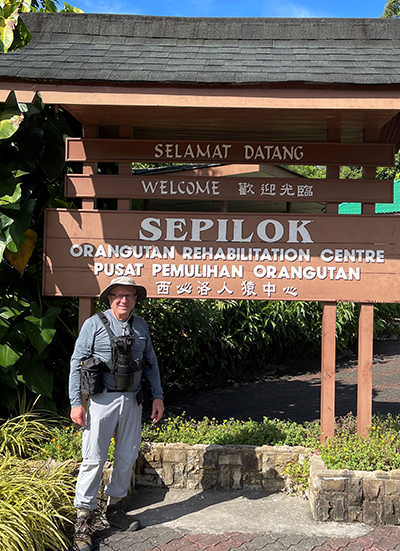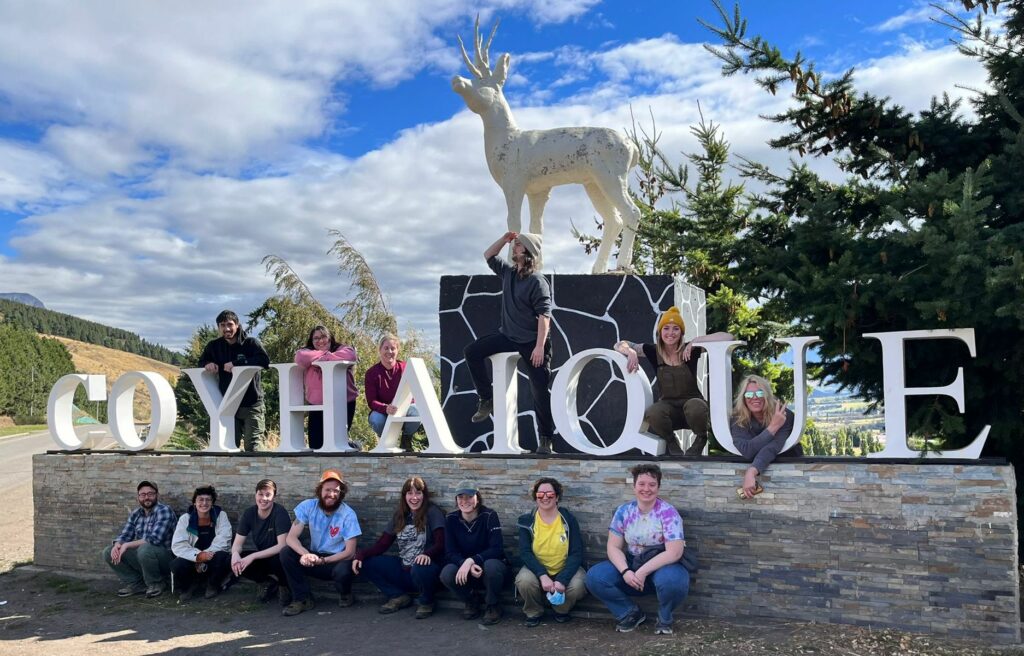PERU
Mariapaola Riggio, associate professor, and Patricia Vega, director of the Wood Based Composite Center, recently welcomed a group of distinguished USDA Cochran Fellows from Peru. The fellows, associated with universities across Peru, explored a diverse range of wood products manufacturers, cutting-edge research at laboratories and observed construction practices at various sites in the Pacific Northwest to learn about the U.S. construction industry and softwood products. The visit was made possible through the USDA Cochran Fellowship Program that promotes the utilization of high-quality U.S. softwood products and aligns with the broader vision of fostering a sustainable construction sector in Peru.


Special thanks: City of Portland, KPFF Consulting Engineers, Jensen Hughes, Michael Thrailkill, CORRIM, Pacific Northwest Carpenters Institute, Truebeck Construction, Andersen Construction, APA (The Engineered Wood Association), Freres Engineered Wood, Modern Building Systems, Boise Cascade, Roseburg Forest Products, Interfor, Royal Pacific, University of Oregon, TallWood Design Institute and the COF Wood Science and Engineering Department.
In partnership with United States Agency for International Development and the U.S. Forest Service International programs, Associate Professor Reem Hajjar has been leading a College of Forestry initiative to enhance teaching and research capacity at two Peruvian forestry universities, Universidad Nacional Agraria La Molina, and Universidad Nacional de la Amazonía Peruana. The initiative will ultimately graduate 12 Peruvian students from the college’s Master of Natural Resources program. In addition to the MNR degrees, post-doctoral scholar Jazmin Gonzales Tovar led research with the students as co-researchers, working with various Indigenous peoples, on making informal forest institutions and enterprises in the Pervuian Amazon more visible.


ECUADOR
Building on the success of the Peru project, Hajjar is working with USFS International Programs to have eight Ecuadorian students from various universities and government agencies complete the college’s Forests and Climate Change Certificate, as well as pedagogy and leadership classes, to advance these topics in their home institutions.
PANAMA
In collaboration with Smithsonian Tropical Research Institute and Centro de Estudios y Acción Social Panameño, Associate Professor Reem Hajjar is initiating a research collaboration on forest restoration governance in the Indigenous territory in Panama — Ngäbe-Buglé Comarca — to better understand how international forest carbon projects interact with local and traditional customs, institutions and livelihoods.
CAMBODIA, THAILAND, VIETNAM
Hajjar is also continuing her National Science Foundation funded work on community forestry in Cambodia, Thailand and Vietnam, in collaboration with The Center for People and Forests, a regional NGO, to assess the impacts of community forests on forest cover, forest biodiversity and community livelihoods.
BRAZIL, PANAMA, SOUTHEAST ASIA (PAN-TROPICAL)
Assistant Professor Loren Albert and her research group are tackling two international projects. The first, funded by NSF, focuses on the ecohydrology of Amazon forests. The other, funded by NASA, aims to advance scientists’ ability to estimate flows of carbon between forests and the atmosphere from space with remote sensing, and includes a partnership with Brazilian faculty to lead a field course for Brazilian graduate students to learn more about concepts in tropical forest ecology and physiology.
INDIA
When world leaders convened in New Delhi for the 2023 G20 Summit, they were handed policy briefs by Think 20 (T20) engagement group to inform their decisions, including one led by Associate Professor Rajat Panwar. As a lead author of one of the policy briefs produced by a T20 taskforce focused on accelerating sustainable development goals, Panwar worked in partnership with four other experts to produce the policy brief, “Aligning G20 Industrial Policies with Biodiversity Conservation.” Panwar is also lead author for the “Bioeconomy Assessment for Latin America and the Carribean” conducted by the Food and Agriculture Organization of the United Nations, with Jazmin Tovar as co-author.

UGANDA
Associate Professor Ian Munanura collaborated with Pennsylvania State University, Shared Planet (a U.K. based NGO), Makerere University, and wildlife conservation institutions in Uganda to investigate research needs for managing human-wildlife conflicts. This collaborative effort culminated in the establishment of the Network for Human-Wildlife Conflict Research in Africa. The primary goal of this network is to establish an online platform dedicated to fostering collaborative research on wildlife conflict and shared knowledge creation to bridge the gap between research and practice in addressing human-wildlife conflict issues.
ETHIOPIA
The College of Forestry International Programs Office recently hosted delegates from Ethiopian Forestry Development, Amhara Forest Enterprise, Oromia Forest and Wildlife Enterprise, and CIFORICRAF, for a nine-day tour of Oregon. They explored forest and fire ecology, tree seed improvement and genetic conservation, timber industry operations and other critical topics. This visit was to support World Agroforestry (ICRAF) in their responsibility for implementing the Provision of Adequate Tree Seed Portfolios in Ethiopia, in coordination with the EFD, the Norwegian International Climate and Forest Initiative and the Royal Norwegian Embassy in Ethiopia.
Special thanks: OSU Extension, U.S. Forest Service, Starker Forests, Sierra Pacific Industries and the Corvallis Sister City Association.


SOUTH KOREA
At the request of the Korea National Institute of Forest Science (NIFoS) — which is establishing landscape level forest management experiments in South Korea in collaboration with the College of Forestry — Associate Dean for Research Katy Kavanaugh and Eric Thompson, CEO of Thompson Timber, traveled to South Korea to give a talk on public and private land management in Oregon. Professor Woodam Chung and Matt Mattioda with Miller Timber Services were also invited to speak at the International Symposium on Forest Engineering Technology for the Establishment of Future Forest Management. The events, held back-to-back in South Korea, included panel discussions as well as visits to timber harvesting and road construction sites in Kangwon Province, providing a detailed look at forest management activities in South Korea.

CANADA
David Hamilton, a forest engineering Ph.D. student from Vancouver, Canada, is collaborating with Edison Motors of Merrit, Canada, the inventors of the first electric log truck (ELT), to map ELT range. Hamilton has invented multiple tools for mapping ELT range across a forest landscape to help alleviate range anxiety amongst policy makers, truck manufacturers and buyers. Last summer, he collaborated with OSU’s innovation team to develop a patent based on his research. In Fall of 2023, Hamilton and Professor John Sessions were awarded a $15,000 Accelerator Innovation and Development grant from OSU to improve and implement his tool, in collaboration with Edison.













